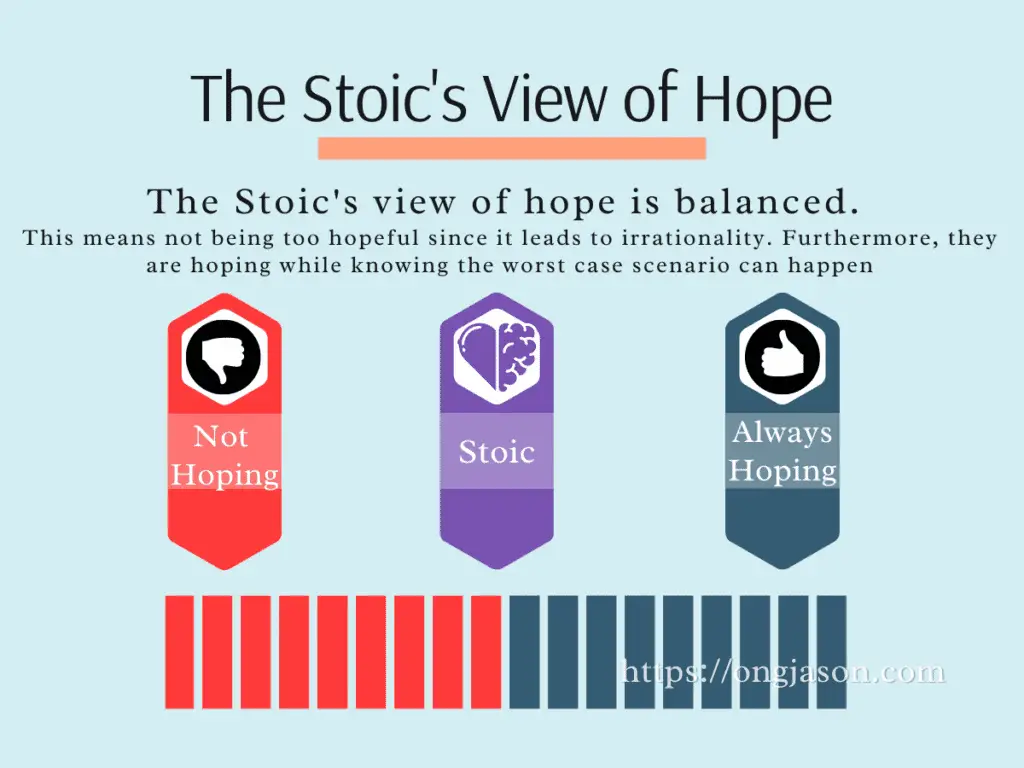Stoicism and Hope: Do Stoics Believe in Hope?
It is only natural for human beings to hope. We want to believe that everything will turn out okay and that we’ll be able to get what we want. But do Stoics believe in hope?
The Stoics believe in hope since it is impossible not to expect a better future. However, they also know that hope is a dangerous emotion and can be irrational as it encourages us to expect something from the future that we can’t control. Thus, the Stoics hope while accepting that their hopes might be delayed or not happen.
This blog post will discuss what Stoics think of hope, mainly what makes it different from other philosophies. We will discuss what Stoics hope for and what they don’t hope for. Also, we will connect the concept of hope to basic Stoic principles.

Do Stoics Hope?
Stoics can hope. However, they are careful about what they wish for. Stoics understand that hoping can lead to frustrations since the future is usually outside their control. Thus, they hope while knowing that the worst-case scenario can also come.
When times are tough, and we don’t know what will happen, Stoicism gives us hope to continue since most things around us are outside our control.
Furthermore, Stoicism gives us the strength to accept whenever our goals or plans don’t come to fruition.
If our plan fails, then so be it. At least we’ve tried.
Sometimes, it’s not that we failed. It’s just at the wrong time.
For example, we may think that we can reach our goals within a year, but the truth is, since there are things outside our control, we don’t know when we will reach our goals.
Stoicism’s view of hope is different from others because it emphasizes our attention to the things we should focus on.
Stoics focus their hope on the things they can control rather than what they have no control over.
For example, they may hope to advance their career, but they’re not expecting to get a promotion magically.
Instead, they hope for advancement while knowing that it can only happen if they improve their skills and connections with their mates.
So, it’s not that Stoics don’t hope. Hoping for the best is part of life.
What separates Stoicism from other philosophies is it helps us focus on what we can do to reach those hopes.
If these hopes don’t come to life, Stoics accept that they can’t change what already happened.
Although, this doesn’t mean that Stoics always hope. As I said, Stoics hope for the things inside their control.
When things are outside their control, they know that they can hope for it, but they shouldn’t expect it to happen.
For example, we can hope for the best for our family members, but we can’t control their actions or whether they want to improve their life or not.
That’s why Stoics hope, but they should be careful about what they wish for.
This is because Stoicism also emphasizes the dangers of hope and fear. Hoping can lead to disappointment, especially if we are hoping for the things we have no control over.
In fact, almost all hopes are outside our control since it is futuristic. If we don’t know what will happen tomorrow, how can we know what will happen in a year or two?
Stoics should accept that hoping is dangerous if we aren’t prepared for the worse. Remember that Stoics know the importance of thinking of the worst-case scenario.
So, it is alright to hope as long as you also know that the things we hope for might be delayed or not happen at all.

How The Stoics Hope
The Stoics hope in a balanced way by expecting the best to come while also knowing that the worst-case scenario can happen. By doing this, they can hope and use it to continue when things are hard. This makes them resilient when things don’t come the way they expect them to be.
The Stoics of Ancient Greece and Rome did not believe in hope.
As I discussed earlier, based on their beliefs about causation and human nature, Stoics believed people should not expect anything outside of what is guaranteed by their nature and natural causes.
We can only rely on what we can control, which is our present thoughts and actions.
Since the future isn’t in our control, we should understand that hoping or expecting the best is not a Stoic way of doing things.
However, this might not be very clear since earlier I talked about hoping and why Stoics can hope as long as we know that it might not happen and we can’t control the future.
Well, that is the point.
We should understand that Stoics hope, but they know how to expect or hope on the right things. That’s what I will talk about in this section.
Like everything in life, balance is necessary.
We can’t be not hoping for a better future since hope can help drive our actions to be better. However, we can’t entirely rely on hope because it leads to disappointment.
Stoicism gives the balance we need regarding hope. It tells us that we should hope but focus on what we can control.
We should hope for the best while not expecting it since it’s essential to be resilient enough for what life throws at us.
Remember that Stoics follow nature, and they accept what throws at them. Therefore, since hoping is trying to think against nature, we should be careful when hoping.
Right now, you know how Stoics hope, what are the things they wish for, and the precautions they have when hoping for a brighter future.
In conclusion, the Stoics believe in hope since it is impossible not to hope for a brighter future. Yet, they also know that hope can be irrational and encourage us to expect the worst. The Stoics taught us to control our emotions with logic and reason.
The Stoics teach us to manage our emotions with logic and reason because hope can be very dangerous; hope can lead us to irrationality, so be careful when hoping.
What’s next? Now that you know about Stoicism and how it sees hope, how about finding out what makes Stoicism the best philosophy? You can read it here: Why is Stoicism the best philosophy?

“Only the things I love.“
ongjason.com is reader-supported. When you buy through links on the site, I earn an affiliate commission.
If you’re following me, you’ll know that I believe it is essential to have some tools, whether it’s for personal development or lifestyle in general.
So, here are the things I love.
YouTube
If you want to learn things for free, I recommend watching my YouTube Channel. Click the Button Below to go straight into my Channel. 🙂
Okay, let me first explain my Channel.
I believe that I really can’t explain everything too well on my blog. That’s why I created a YouTube Channel so I can easily explain a lot of things. Plus, I believe that Video Sharing is the future.
Recommended Books
The next thing is books. Books are, for me, one of the cheapest ways to get invaluable information. We can learn personal development, finance, career, relationships, and many more from books.
Here, I will be listing my favorite books in different categories.
- For Beginners – 7 Habits of Highly Effective People by Stephen Covey – Personal development has a lot of concepts and ideas to learn. Thus it can be really hard for beginners to know where to start. Thus, I recommend this book since all the basic concepts of personal development are here(except finance, check what I recommended for that)
- Productivity – The One Thing by Gary Keller – This book teaches us the power of focusing on one thing which is the ultimate source of productivity. The concepts taught are what I am using to constantly publish YouTube videos while maintaining this website.
- Busy? – Make Time by Jack Knapp – This book teaches us how to make time for the things we love. The concept is really simple but I think that makes it a book worth reading.
- Health – Lifespan by Dr.Sinclair – This Book teaches about the latest scientific research on lifespan. In his book, he has shared numerous things he is doing to slow down his aging process. This can be as easy as eating less which he recommends.
- Finance – The Richest Man in Babylon by George Clason – Perhaps one of the first books I’ve read about Finance, this book for me is the best if we are talking about learning basic finance such as basic saving and investing. The concepts are very simple but effective.
Audiobooks
Take this advice as a grain of salt.
I don’t recommend buying Audiobooks one by one. I mean, audiobooks can be quickly finished by listening while working out or doing some mindless tasks.
So here is to save you some money. Just go for a monthly subscription to Audible. I believe that you will save a lot of money with that plus, they usually give freebies to anyone starting.
My Audiobook Recommendation will always be the same as my book recommendations, but I personally like The 5 Second Rule by Mel Robbins. I like how she is so casual while reading her book.





![How to Be a Hardworking Student [20 Tips]](https://ongjason.com/wp-content/uploads/2021/07/Girl-Studying-768x576.jpg)

